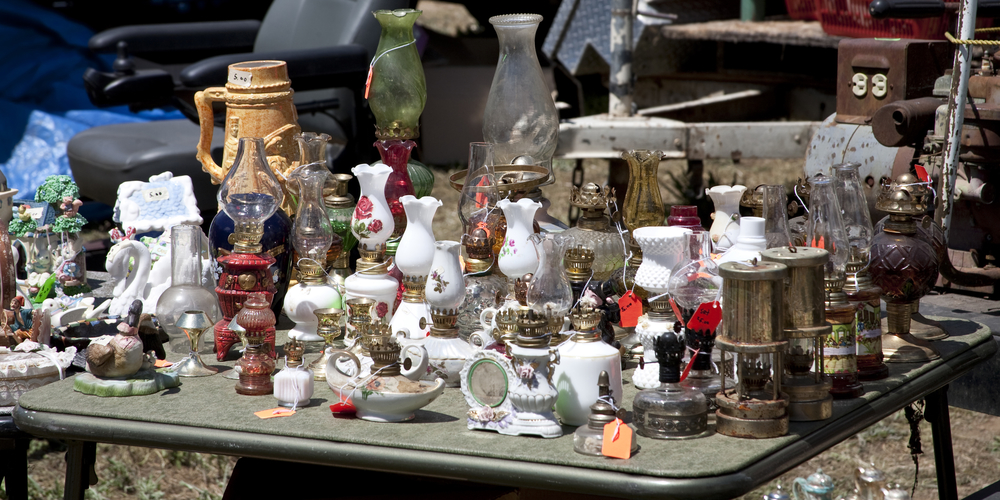
Buyout Companies that offer a fixed price to buy everything in the home will always offer less than liquidation value which is significantly lower than fair market value. This is because they make their living on what they can sell from the buyout. And, they factor in the cost of labor and dump fees to remove unsellable items. The advantage is that they will haul everything away immediately. This is a good solution when there is a short timeline and everything must be out of the house asap. You may be able to request that the home be left in “broom swept” condition. However, understand that this is not the way to maximize revenue from the sale of your items, because the incentive of the buy-out company is to make an income off of the items they attain.
Traditional Estate Sale Companies invite the local public into the home to shop over a 2 to 3 day period. Items are generally sold at liquidation value prices, (some may start at fair market value), and prices are lowered significantly on the last day of the sale. A traditional estate sale works best in homes where people no longer reside. The traditional estate sale might not be as selective as a local auction company, because they are willing to sell $5.00 items with the understanding that it all adds up in the end. They usually take a minimum of 35 – 50% commission. There will be extra dumpster fees or haul away service fees, which is usually about $600-$800. In addition, you may have a waiting period to engage their services.
Online Auction Companies are a great solution for when you do not want to have strangers shopping in the home. Having collectible items on an e-commerce platform is likely to maximize the selling price because your bidding audience is usually large. Online Auctions can sell items for liquidation value and fair market value. However, there is no guarantee for prices realized because it is an auction. Usually, there will be items that need to be hauled away from the home in the end, but that is the case in almost every scenario. Most of these auction companies take a 30%-35% commission with an additional 10% buyers premium. The buyers premium is paid by the buyers only.
Local Brick and Mortar Auction Companies are a good solution for getting sellable items out of the house quickly and into the hands of the sale venue. However, you will need to find solutions for the items the auction house does not take, which usually requires hiring a haul away company. If you cannot bring the items yourself to the auction house they will charge a moving fee ranging from $50 to $100 an hour that is deducted from the end proceeds of your sale. Some of these local auction companies can be very selective. You will need a representative to come out and walk through the home with you to tell you what they are willing to sell. A disadvantage may be that the audience is limited in number compared to an online audience. However, many traditional auction companies are starting to sell select items online for clients. Most of these auction companies take a 40%-50% commission with a buyers premium. Remember that there is no guarantee for prices realized because it is an auction.
Tier 1 Auction Companies include companies such as Christie’s and Sotheby’s. After consulting with an appraiser, you may find that your collectibles, art or antique furniture needs to be sold in a unique market. Tier 1 auction companies might have the reach that those items require. In addition, artwork may require authentication and these companies can provide authenticators and specialists.
Consignment Shops Consignment shops will try to sell items for as high a price as possible for you, but it may take a couple months. This can be a great solution for fashion items, clothing, home decor and furniture in excellent condition. The shops will be selective about condition, time of year and demand in the market. Consignment shops take a commission that can be as high as 55%. Some will provide a pick up service for an extra fee.
Social Media Selling Platforms ( Facebook Marketplace and Nextdoor.com) These are great resources if you are selling furniture, exercise equipment, contemporary home decoratives and children’s things. Note: most established auction companies will not sell children’s items due to liability risk. The nice thing about selling through social media sites is that you are interacting through a private platform with people in your immediate neighborhood/community and they are responsive to the set price you ask them to pay with minimal bartering. They usually pay in cash or Venmo. In fact, people can now pay each other directly through Facebook. You eliminate the commission that auction and estate sale companies will charge. You will need to private message the admin in charge of the group and simply request to join. Nextdoor.com will ask to verify your residence in the neighborhood with an address or phone number. If the item does not sell on these sites for the price you want, then it is an indicator that the item has a liquidation value or less and an auction or estate sale is a better route of sale if you do not want to donate the item. Note: there are new social media selling platforms popping up all the time including OfferUp.com and LetGo.com
Craigslist is a fine place to sell your things if you are comfortable with a variety of strangers contacting you and negotiating. It is like social media markets, but the audience is much larger, it is public and people will try to haggle. Like the social media selling sites, It is not an auction. You must set your price. You will need to establish a free account. Craigslist is a good place to sell lawn equipment, tools, large appliances, vehicles, boats, trailers, exercise equipment and musical equipment including pianos. Beware that there are con artists on Craigslist. In order to play it safe, never share your personal email with anyone no matter what they tell you, (Craigslist encrypts your email for this very reason), do not sell anything to a person that sends you money via PayPal that comes through as a pending status instead of a completed status and be wary of people that want to advance you money to cover their own moving fees. It is advised to stick with cash in hand payments. If you are selling a larger item such as a car, then you might accept a cashiers check that you coordinate with the buyer in person at your bank.
eBay and Replacements.com…Anything you would sell through an online auction company will sell successfully on eBay. An eBay account is free and you might need to create a Paypal account to feed transactions through, which is free to set up. eBay will charge about 15% total and Paypal takes an additional 3% of processed sales. eBay is risky if you are selling breakable items or very fragile items, because they can automatically refund the buyer at their discretion. Replacements.com is a company that sells china, collectibles and sterling silver flatware to people that need to add items to their collections. If you send them pictures of your items, then they will quote you an offer to purchase those items. You might make less on Replacements than on eBay because Replacements needs to turn around and sell the items for a profit. Both of these selling venues will require you to manage and pay all shipping fees and insurance for shipping the items. The time frame for selling items on eBay or Replacements will be longer and require more work on your end than it would if you were to hire an auction house or estate sale company.
Shopify.com and Poshmark.com are the do it yourself solutions for designer clothing, shoes, handbags and other designer accessories. These sites are similar to eBay in that you will do the work yourself and share a similar type of fee. You will set up your own cyber storefronts and put fixed prices on the items you sell. Clothing and fashion items can require a very nitch marketplace for selling. One thing to keep in mind is that they need to be in excellent condition. Any flaws to condition diminishes value drastically.
ETSY.com and RubyLane.com are great venues for selling antiques and collectibles for antique store prices. It is similar to Poshmark and Shopify in that you are setting up your own cyber store fronts. You will need to manage shipping and customer service issues the way any antique shop would. And, your time line for selling your items could be days to months. These venues will take a small percent of the sales. You might need to have an account with PayPal to process sales. Sometimes these selling platforms will collaborate with Venmo.com, Cashapp and Square app. ETSY.com is also a good venue for selling hand crafted items. Items need to be in excellent condition, because any flaws to condition will diminish value. Posting a lot of pictures is key for all online marketplace sales. A few other similar online marketplaces include Chairish.com and eBay storefronts.
Amazon.com is a great way to sell books. Textbooks, fiction, best sellers and more will sell on Amazon. Books are very hard to sell in general if they are not first editions, leather bound volumes, signed by the author, collectible antiques or popular complete series such as The Harry Potter Series . Most auction and estate sale companies have to sell books for pennies on the dollar or they must donate them. Selling through Amazon will be a time commitment just like an eBay store or ETSY. In addition, it could be consuming of space since you need to store the books somewhere protected while you are trying to sell them.
Refineries, Precious Metals and Coins Refineries are the best solution we have found so far for precious metals that you might want to scrap. They are giving the highest return on value. If you wish to maximize the money you are able to make, then it is advised that you avoid gold buyers and jewelry shop offers. They are the “middle man” and they need to make an income off of what they buy from you. Some of them send the precious metals to the refineries themselves. In addition, always assume that a box of costume jewelry will have a percentage of gold and sterling silver in its mix. Arrange a consult with an appraiser that can look through all the jewelry to identify items of high value and advise select avenues for selling. In regards to coins and stamps, you will need to find a local Numismatist because there is a large range for valuation and it is a very niche area. A Numismatist is a specialist that can identify and appraise coins and stamps. Some of the tier 1 auction companies might have these specialists on staff.

I’ve been absent for a while, but now I remember why I used to love this blog. Thank you, I’ll try and check back more often. How frequently you update your web site?